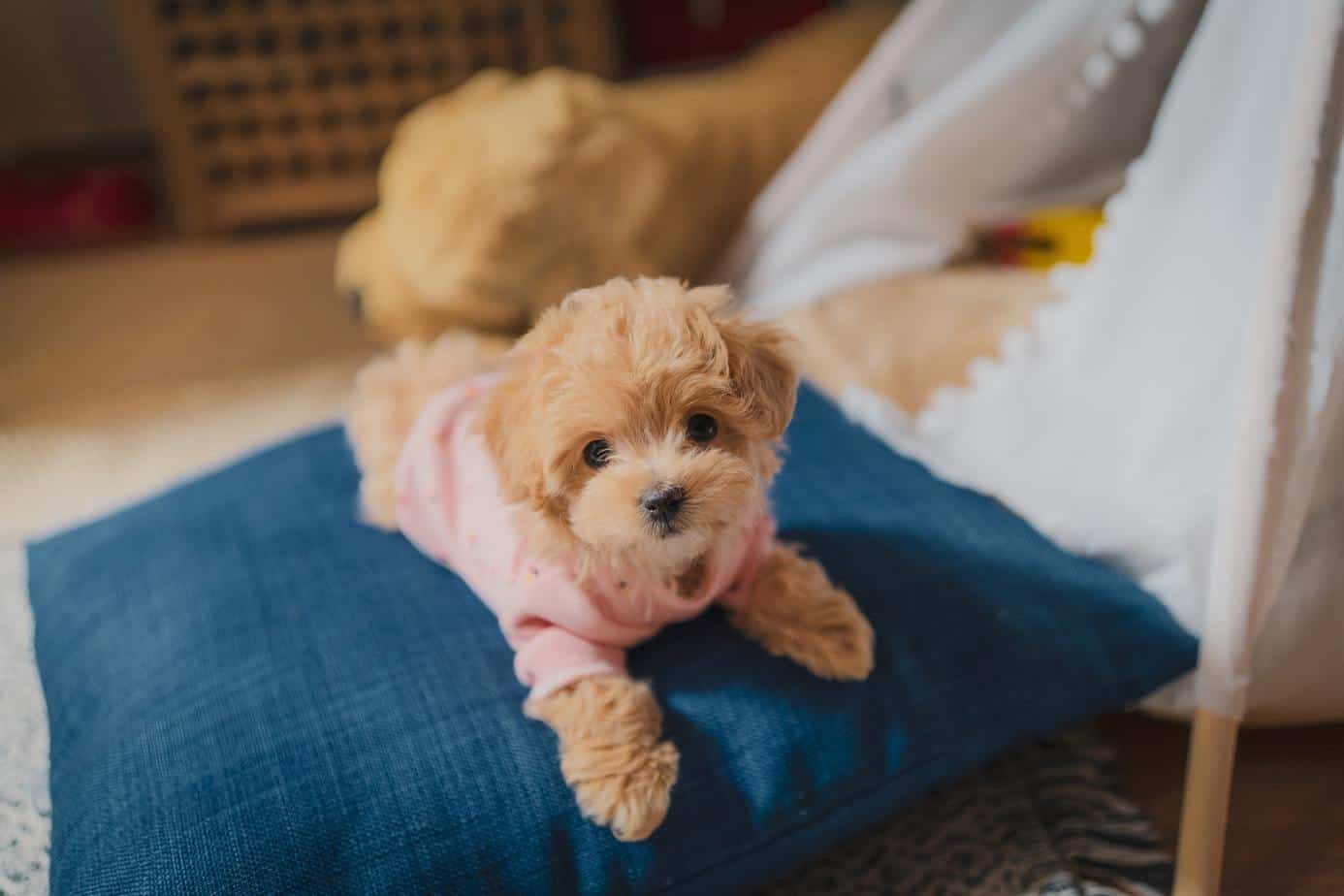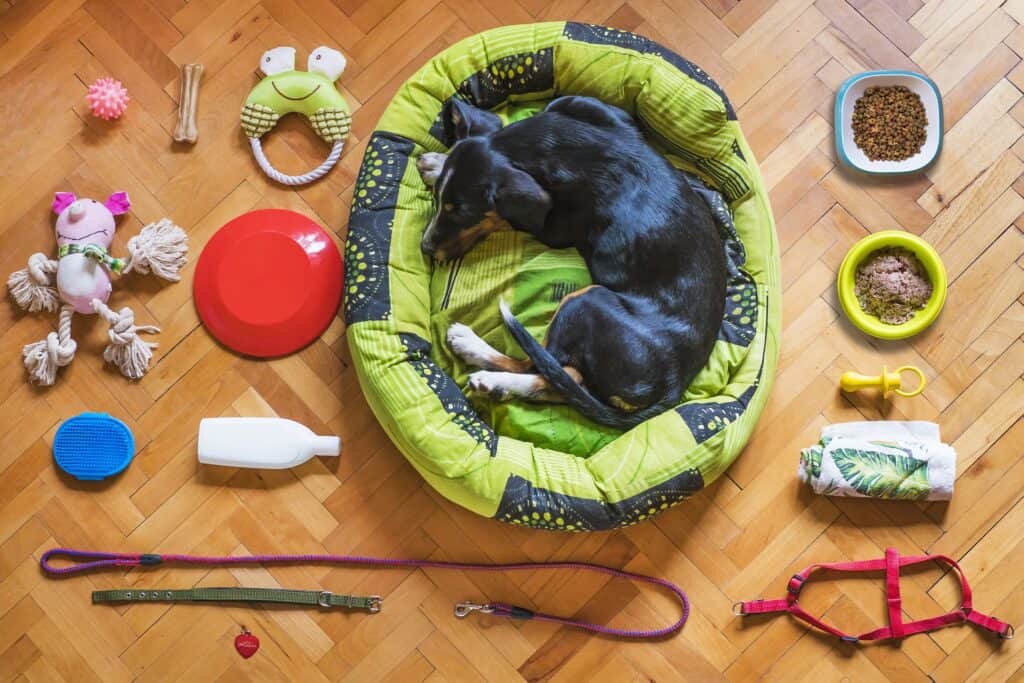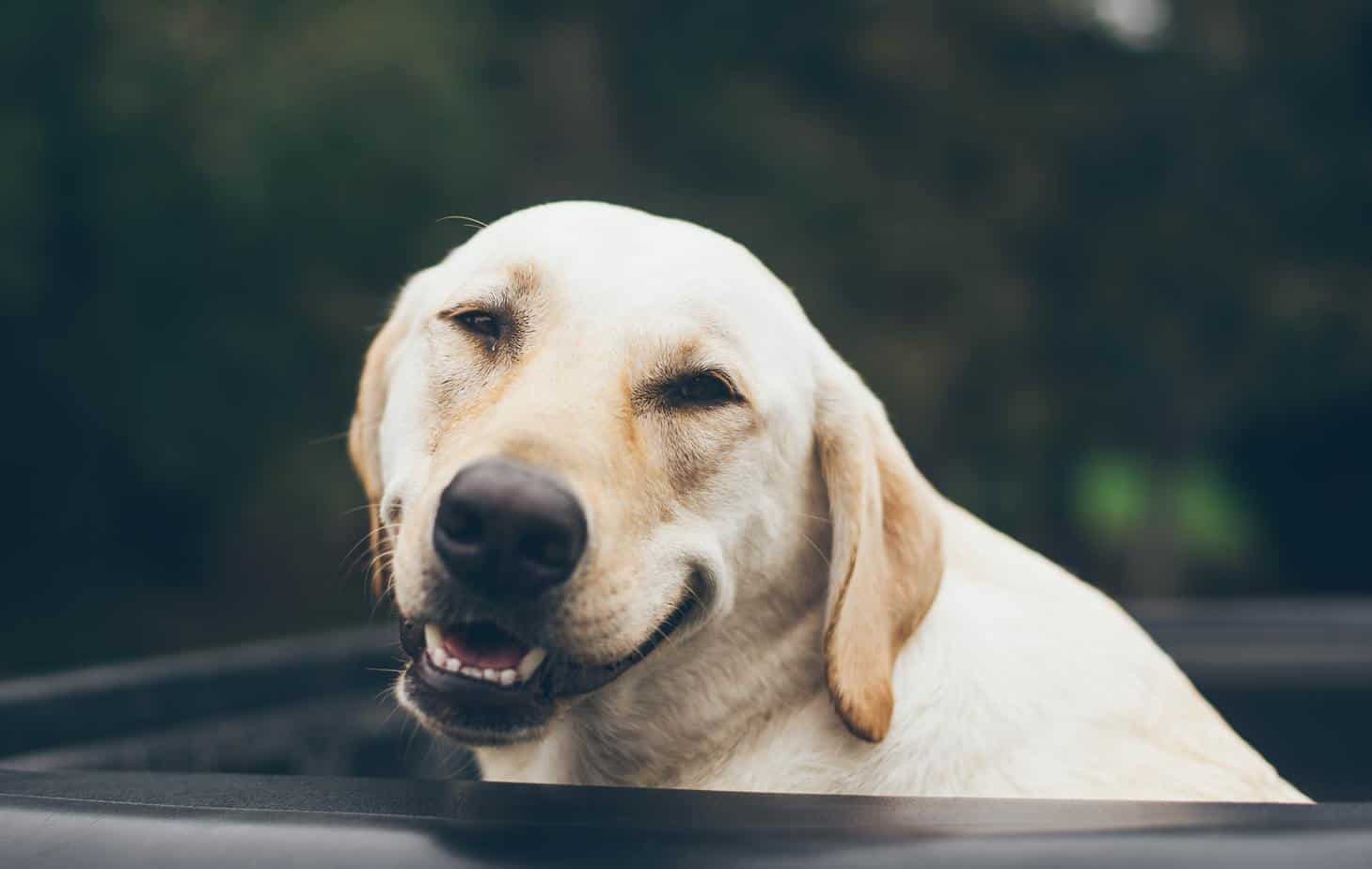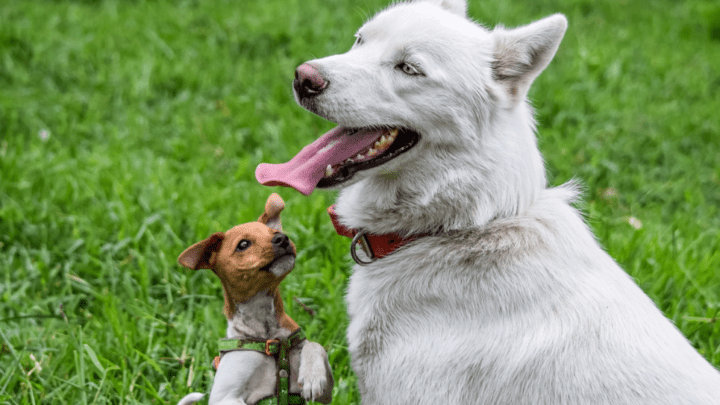- Nom Nom Dog Food Subscription Review - November 7, 2023
- 7 Best Dog Bed Ideas For Great Dane (DIY Options) - July 16, 2022
- Top 5 Rated Best Non-Prescription Diabetic Dog Food - July 15, 2022
Many people who’ve decided to bring a dog into their lives automatically picture a puppy. After all, puppies are at the top of the cuteness scale. They want to play all the time and are an endless source of amusement. They’re also a great way to meet new people because everyone wants to pet a puppy. You have to assess whether you and your family are ready to adopt a puppy, however and we’re here to help.
The most important decision to make when getting a dog is if you can handle the work a puppy requires. You should also think about your lifestyle. You may decide an older dog is more realistic. You also have to figure out what you need before you get a dog and whether to adopt from a shelter or go to a breeder.
Finally, we’ll talk about different breeds of dogs and whether or not a certain breed is better for you, regardless of its age.
Adopting a Puppy Pros And Cons

Remember that there are several stages of development after the puppy stage and each are candidates for adoption depending on your resources and needs. Adolescence is from 5 to 18 months, adulthood is 18 months and older, and the senior stage is reached at different ages according to the breed. Some adult dogs, senior dogs, and some adolescents are considered older dogs.
Puppies need what may feel like massive amounts of time and attention. They tend to be messy and chew on everything in sight.
They will need to be house trained and socialized. Everything you want them to do, you will have to show them in a way that a dog will understand.
You cannot leave a puppy alone and expect him to behave according to your wishes — so if you plan on getting your dog on Friday and then heading off to a full day of work on Monday, a puppy may not be the best choice.
Let’s take a logical look at the pros and cons of adopting a puppy.
Puppy Con: House Training A Puppy Is Hard And Time Consuming
Puppies are a lot of work. They don’t arrive in your home knowing where you want them to pee and poop any more than babies arrive potty trained. It will take some time for your puppy to adjust to a potty routine which is why he may keep you awake with his crying for the first few nights.
While you may find yourself house training an older dog as well, puppies will absolutely need this instruction. For detailed tips on house training read our article all about potty training your puppy. It is packed with handy information you can use to make this task easier.
You must seriously consider things like the level of help your family will give you, your lifestyle, and your tolerance for ruined carpets and furniture before deciding on a puppy.
Puppy Pro And Puppy Con: Puppies Are High Energy
This consideration goes both ways so we’ll talk about adopting an older dog pros and cons at the same time. Some people love high energy puppies and others are short on patience or time.
On the one hand, puppies are young and impressionable and some owners feel they form stronger bonds as a result. Families with children often value the experience of their child growing alongside their best fuzzy friend.
On the other hand, puppies may race around your home like a furry tornado, so they should be supervised to prevent destruction and injury. Puppies need your attention, care, patience, and most of all, time.
Puppy Pro: Puppies Are Adorable
We can’t forget how adorable a puppy is, either. That is a big emotional tick in the pro category. It may be the biggest reason people adopt puppies over older dogs.
The truth is that your decision to get a puppy or an older dog is usually made on emotion and not logic. All of the puppy pros and cons in the world won’t deter you if your heart is set on a puppy.
If the ‘awww factor’ is your main motivation and you have reserved doubts about living with a puppy, remember that some breeds retain a puppyish look their entire lives. This fact can allow you to split the difference with an older dog you’re compatible with that is just as cute.
I know you want a puppy- I’m just saying that you can have your cake and eat it too here.
Puppy Con: Who Will You Puppy Be When He Grows Up?
An older dog has a personality already. While it is true that dogs often become more outgoing and affectionate outside the shelter, you still have more to base an opinion on than with puppies.
Puppies may be shy or outgoing, but it’s difficult to tell other personality traits like how they will get along with other animals or children.
Who your dog is when he grows up has a lot to do with what you teach him. Do you feel confident that you can raise the kind of dog you want to live with?
This puppy con is an adult dog pro. You can visit any dog you are considering more than once and start to get a sense of how he is with you. Additionally, you can talk with the staff to get their valuable input.
Puppy Con: Puppy Training Is Time Consuming And Expensive
If you bring a puppy home, you’ll have to puppy proof your home, arrange for obedience training, and deal with the chewing phase. If destruction frustrates you, think twice about a puppy.
Older dogs are generally house trained. It will be obvious in most cases if the dog already is a voracious chewer. If that doesn’t work for you, you can meet a less chewy dog. With puppies on the other hand, chewing is inevitable.
As many pros and cons as we review, this is still a personal choice that comes down to your lifestyle, budget and patience.
Research Dog Breeds
There is more to consider than just a dog’s age when you’re adopting. You may be attracted to one breed in advance because you like it’s appearance, but research is necessary to ensure you can meet the needs of that breed. You must also be sure the breed is a good fit for your personality and lifestyle.
For example, if you’re into swimming or water sports like kayaking, canoeing, and rafting, and you’d like to bring your dog along, don’t get a bulldog. Bulldogs don’t swim and can drown very quickly.
If you want to take your dog with you on a daily run, don’t get a flat-faced breed, like a pug, French bulldogs or a shih-tzu. These breeds are prone to overheating and breathing problems, so they’re not meant for sprinting or distance running.
If you want a “wash and wear” dog, don’t get an Afghan. Afghans have long silky hair that requires regular bathing and brushing to prevent the hair from matting.
Keeping these scenarios in mind, the first thing you should do if you’ve decided to adopt a dog is to research the characteristics and needs of the dog breeds you’re interested in. Once you’ve decided on a breed, the search for your dog begins.
How To Prepare For Your Puppy

To make your puppy’s transition as comfortable and positive as possible, you’ll need to prepare for his arrival. Let’s review some of the things you need to keep in mind.
Talk With Your Family First
If you have children, set down some ground rules before your new dog arrives. They must be gentle with the puppy. Emphasize that dogs are not toys; they are breakable. Do you own research first and carefully consider if your family is right for a dog at all at this time before you even bring it up.
When you first bring the puppy home, the kids should not overwhelm him, fight over him, scream and run around, or invite all their friends over. Small children should be supervised when playing with the puppy, and they should never take the dog for walk on their own.
These tips go for adopting an older dog from a shelter or previous owner as well. You may find an older dog adjusts more quickly to your home. If the dog experienced abuse or neglect, however, it may be a long and patient road to nurture him back to his former glory.
Your children can be a helpful part of this process if you discuss expectations clearly. Don’t pile on tasks the children aren’t ready for, but do give them age appropriate chores so they can help care for your new senior dog.
Dog Proof Your Home
We wrote an entire article just about dog proofing your home, but I’ll summarize the important parts for you here.
Start with the place your puppy or new adult dog will spend most of his time and fan out from there.
- Tape down electrical cords or run them through cord concealers to prevent puppies from chewing on them and getting burned.
- Screen off fireplaces and electric heaters.
- Tie up cords for drapes and venetian blinds to prevent strangulation.
- Keep windows and doors closed. During warm weather, make sure open windows are screened.
- Use a baby gate to barricade staircases.
- Keep puppies away from rocking chairs, recliners, and sofa beds, which puppies can climb into or under and harm their tail or legs.
- Close toilet lids and empty sinks as they are drowning hazards.
- Put away socks, tights, underwear, and other small clothing items that puppies can swallow, causing intestinal blockage and often requiring surgery.
- Some plants are toxic to dogs and should be removed, including Lilies, Autumn Crocus, • Dieffenbachia, Sago Palms, Tulips, and others.
- Secure all cleaning products and medicine, including aspirin and vitamins. Don’t leave pill bottles within reach as puppies can chew through them.
- Put away any tobacco products, including nicotine gum and patches.
- Put away small items like coins, sewing needles, yarn, dental floss, rubber bands, paper clips, golf balls, fishing gear, and jewelry that puppies can swallow.
- Make sure your puppy cannot get to human food, some of which is toxic to dogs, including grapes, chocolate, raisins, seeds and pits from fruit, candy, coffee, alcohol, gum, and others.
- Keep garbage out of reach, especially when it contains items like chicken bones, the string from a rib roast, plastic wrap, fatty foods, and any uncooked fish, meat or poultry.
- Finally, get down to your puppy’s level and look around. Pick-up anything you find that can cause choking.
Find A Dog Walker
Another thing you need to do to prepare for your new dog is book a dog walker. If you are home all day this won’t be necessary. If you’ll be away for a portion of the day, however, consider hiring a dog walker.
This is particularly important for puppies. Older dogs can also benefit from a couple of weeks at least of daily exercise and company while you are at work. If you can’t pay for long term care, an older dog may be a better choice for you.
To find the right dog walker it’s a good idea to get references from people you know. If you don’t have friends with dogs, the neighborhood vet may help.
Buy Dog Supplies

Take a trip to your local pet supply store. Being prepared and having a safe, comfortable space ready for your new puppy will make the transition easier, both for you and for them.
What do you need to have before bringing home a puppy? It’s best to have a plan before you get to the store. We’re here to help.
Food
If you’re getting your puppy from a breeder, find out what food the breeder is using. It’s best to continue feeding that food for at least a few weeks. Buy a bag of that food before his arrival. Also, find out the amount and the feeding schedule.
Food and water bowls
Buy these bowls in the appropriate size so that your puppy can easily eat and drink from them. Bowls that have rubber bottoms are good choices for rambunctious babies because they keep the bowl from sliding around.
You may want to get two sets of these bowls because they should be washed frequently. The bowl should be washed out first with hot water and the water changed several times a day.
You can also get an electric drinking fountain for dogs that aerates the water.
A harness/collar and a leash
Determine the approximate weight and neck or chest measurements and don’t buy for appearance. A harness is preferable for toy breeds and brachycephalic breeds, which are prone to breathing problems, such as the Bulldog, Pug, French Bulldog, Boston Terrier, Shih Tzu, Pekinese, Japanese Chin and Lhasa Apso.
A harness puts the pressure on the chest rather than around the neck.
A dog bed
A bed in the perfect size for your puppy will give him a place of his own to claim. As you get to know him, you will discover which kind of bed he prefers.
There are different options to choose from including nesting beds, cave beds, dome beds, flat beds, even stuffed animal beds. Some of these beds can be expensive. Since your puppy will grow, go for the least expensive option until he reaches his full size.
A crate/gate/snap together exercise pen
To housetrain your puppy, you need a way to constrain him to a small area. Crates should be provided for your dog as a “den,” a place where your dog is calm and comfortable.
When you buy a crate, add a crate bed to cushion the bottom and a small dog blanket to give your puppy a place to nest. Crating teaches your dog to “hold it” until you take him out for a walk.
Your dog should associate the crate with safety, so never use crating as a punishment. Puppies should never spend more than three to four hours at the most in a crate, and dogs in general should not be crated for a long periods as they will begin to feel frustrated and depressed.
You will have to take your dog outside frequently during the housetraining process, which is why a dog walker comes in so handy.
An alternative to the crate is a gate that will keep your dog in a small room, such as a bathroom, kitchen or small spare room. You can also use an exercise pen to contain your dog without confining him.
There are many different types of gates from pressure attachments and permanent hardware to stand-alone. Make sure you buy a gate that is tall enough, so your dog cannot jump over it. You will need to cover the floor with puppy pads at first until your dog is housetrained. Fresh water should always be available, and leaving your puppy with safe chew toys will keep him occupied.
If you don’t have a room, a snap together exercise pen or a large portable playpen can be a perfect solution. The great thing about a play or exercise pen is that it’s portable. You can cover the playpen with puppy pads and place it near your bed at night so your puppy can see or smell you, which will reassure him and cut down on crying and whining.
During the day, your puppy will be happy in a roomy area created by the snap together gates. Cover the floor with puppy pads, leaving a small space for a bed, a bowl of water, and a bowl of kibble if you are free feeding. Take one puppy pad away each day until you only have one or two left. Remember to praise your dog enthusiastically when he uses the pad; if you don’t show him where you want him to go, the only one you can blame for an accident is yourself!
Sweaters, coats, or t-shirts
If you live in a cold climate, your dog will probably need some protection unless you have a breed made for cold weather like the Husky, Alaskan Malamute, American Eskimo, Chow Chow, or Bernese Mountain dog. Luckily there are some pretty cute dog sweaters out there!
For many breeds, if you need a sweater or coat so will they. Dogs will short coats or breeds with single coats like the Yorkshire Terrier, Poodle, Maltese, Bedlington Terrier, and others, are more sensitive to the cold than breeds with undercoats.
Keeping your puppy safe: IDs and microchips
Your new puppy will also need an ID tag with your contact information. This is the easiest way to ensure your dog’s return if it gets lost.
It’s also highly recommended that you get your puppy microchipped on his first visit to your veterinarian for vaccinations. A microchip is essential protection in the event that your dog runs away. If the dog is scanned by a rescue or vet, your information will appear so you can be reunited.
Shots and puppy vet visits
Your puppy will need a series of vaccinations over the first four to five months of his life. These will protect him from deadly diseases like distemper, parvo, rabies, and other diseases and parasites.
This is one of the reasons that puppies cost a bit more when it comes to medical care. If you adopt an older dog from a shelter or rescue, he will already have his shots and will only require occasional booster shots.
Puppies also must be neutered or spayed which is a costly but vital endeavor.
Pet stain & odor remover
Puppies have accidents. They don’t come potty trained any more than a baby does. Your cleanliness and patience will be saved if you accept it and prepare.
Sprays like Nature’s Miracle not only neutralize any accident smell, but they leave a scent that will discourage your puppy from marking there again.
Toys
A variety of toys will keep your puppy out of trouble and help him leran. There are numerous chew toy options, but supervise your dog’s play to prevent accidental choking.
For the times when you’re not there, a Kong toy filled with cheese, peanut butter, or kibble is a great option.
A stuffed animal toy will provide comfort to an anxious puppy, but do not use one made for people. Stuffed animals for dogs are manufactured for a dog’s teeth and behavior, so they are safe.
These preparations will set the tone for a safe, happy, and rewarding relationship with your new family member.
Adopting An Older Dog
It isn’t all about puppies, however. If you aren’t sure a puppy is right for you because you can’t meet all of the requirements, think about an older dog.
There are several good reasons to adopt an older dog, but at the top of the list is the fact that older dogs make great pets. While we examine why that’s true as well as all of the reasons older dogs make great companions, I’ll expand on some of the points raised earlier.
Adopting an Older Dog Will Save Their Life

When you adopt an older dog, especially from a shelter or a rescue organization, you will be saving a life. Animal shelters are always overcrowded, and older dogs are at the top of the list to be euthanized.
Additionally, some people feel adopted dogs are grateful and form stronger bonds with their owners. Other people choose to adopt because it makes them feel good. Still others start out as foster homes, fall in love with their ward, and choose to become their forever home.
Whatever reason you choose adopting an older dog, you’re doing a service for the animal as well as your community.
Older Dogs are not Problem Dogs
Dogs are taken to a shelter for many different reasons above and beyond behavior problems.
Older dogs lose their homes because:
- Their owner can no longer afford to take care of them.
- The family is moving to a place that doesn’t allow dogs.
- The dog doesn’t react well to a new baby.
- The new baby replaces the dog in the parents’ minds.
- The owner has died.
- The owner has lost their job or their home.
- Someone in the family develops an allergy.
- The owner’s work schedule changes.
- The owner doesn’t want to be a dog parent anymore (this is the worst reason).
You can consult the care givers at the shelter or rescue about a dog’s personality. Ask pointed questions and let their experience guide you to a dog without behavior problems who is best suited for your lifestyle.
Don’t assume all the shelter dogs are dangerous or destructive.
Older Dogs Make Great Pets
Older dogs are often housetrained and understand basic commands. This is a major hurdle to vault over and it’s extremely attractive to many owners. You don’t have to be short on time to appreciate skipping puppy training.
Older dogs are often less expensive. Between the series of puppy shots, dog walkers, obedience training, and the amount of food puppies need, the budget can burst.
Speaking of training, you’ll find that you can teach an old dog new tricks! Older dogs are calmer than puppies but can be very playful too. This is a great mix of a slightly longer attention span necessary to learn complex tricks and the eagerness to do it.
If you adopt a senior dog, however, she may not exactly be playful. Instead, senior dogs are calm and loving. Older dogs often bond quickly and show great devotion.
If you already have a younger dog, and are looking for a companion, and older dog can teach your puppy good manners.
Remember that an older dog is really any adult dog. A senior dog is in advanced years. Not all ‘older’ dogs are in the twilight of their lives. In fact, many dogs in shelters have tons of life left. This is a huge benefit because an older dog has an established personality for you to get to know but is still youthful. This increases the chance of compatibility and deep bond forming.
With a puppy, you never truly know who you’ll be living with once she grows up.
Prepare for Your Dog
If you choose to adopt an adult dog, you still need some supplies. Older dogs have similar needs to puppies, but are a bit simpler.
Make sure you have the following items on hand:
- A dog bed. There are heated beds that older dogs will love.
- A collar or harness and a leash.
- A water and a food bowl.
- Dog food. Do some research to find a high-quality food.
- A dog blanket. Some older dogs, especially dogs that have spent time in a shelter, love to sleep with a blanket of their own.
- Food and water bowls. Raised dog bowls for larger breeds will make them more comfortable.
- Toys. Chew toys will keep your dog occupied, and a stuffed animal toy may bring your dog comfort.
- Puppy pads. These are recommended if you’re bringing home a small breed dog unless you are able to walk them four to six times a day. Some housetrained dogs get confused in a new home and if that happens, you’ll want to have some pads on hand!
- Dog steps. If you are getting a small breed, consider getting a set of dog steps so your dog can get up onto your furniture and into your car safely.
- A crate, gate, or baby gate to keep your new dog confined to a small place initially.
Get as much information as you can from the former owner, shelter, or place where you’ve found your new (older) dog. If the dog has been abused or is a puppy mill survivor, connecting with a behaviorist either through the shelter or your veterinarian will give you support and the methods to use that will help your dog adjust.
Allow your new dog the space and time to feel safe in his new environment. If you’ve adopted a dog from out of state or a rural environment and you live in the city, plan to spend time introducing your dog to the city just as you would a puppy.
Don’t be alarmed or discouraged if it takes a little while for your dog to adjust to the hustle and noise, especially if you live in Manhattan. If you are a calm, assertive presence, your dog will trust you with his life. Just give him time to understand that you will take care of him, and that this is his forever home. He will reward you with unconditional love and loyalty.
How Do You Choose Between A Puppy And An Older Dog?
Only you can make the right choice of a puppy or an older dog. There are drawbacks and benefits to both and it’s a personal decision. However, just reading this post and considering your options is a big step in the right direction.
Do you have the patience, time, and extra cash puppies require? Are you more interested in a dog who won’t destroy your furniture? Remember to talk with your family about the decision so everyone is on board.
Whatever you choose, enjoy the process of bonding with your new furry friend.
Continue reading:
What You Need to Know Before Rescuing a Dog




